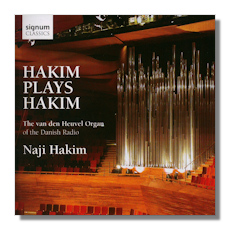
The Internet's Premier Classical Music Source
Related Links
- Hakim Reviews
- Latest Reviews
- More Reviews
-
By Composer
-
Collections
DVD & Blu-ray
Books
Concert Reviews
Articles/Interviews
Software
Audio
Search Amazon
Recommended Links
Site News
 CD Review
CD Review
Naji Hakim

Hakim Plays Hakim
- All My Founts Shall Be With You
- I Love the Colorful World
- Sakskøbing Preludes
- To Call My True Love to My Dance
- Glenalmond Suite
- Aalaiki'ssalaam
Naji Hakim, organ
Signum Classics SIGCD222
Naji Hakim was born in 1955 in Beirut. He studied with Langlais and at the Conservatoire National Supérieur de Musique de Paris, is a licentiate teacher in organ from Trinity College of Music in London and has won numerous prizes at international organ and composition competitions. In 1993 he became organist of l'Église de la Trinité (Messiaen's church) and holds a variety of teaching posts – including that of visiting professor at the Royal Academy of Music, London. This CD of his was chosen because it claims to be something a little different. CDs of modern organ music do not exactly clamor for our attention.
Hakim's music is inspired by religion. Indeed, his website carries a quote by Leo F. Buscaglia… "It's not enough to have lived. We should be determined to live for something. May I suggest that it be creating joy for others, sharing what we have for the betterment of personkind, bringing hope to the lost and love to the lonely." Hakim's music is nowhere near so experimental or innovative as that of Messiaen. The organ music on this CD is all tonal and conventional in spirit and execution. Much of it is almost "jaunty" in tone and feel. But it has a certain interest and substance nonetheless.
The CD was recorded on the van den Heuvel organ of Danish Radio, a splendid, sonorous and rich 32-foot instrument of four manuals, pedals and 91 stops in the concert hall opened in January 2009 as part of the new DY-BYEN media complex of the Danish broadcasting organisation. It does the music proud and adds a solemnity and immediacy to Hakim's transparent compositional style. Fuller details of the organ are given in the short but informative booklet that comes with the CD.
Hakim's music has a genuineness to it which defies what might otherwise be a rather "precious" vein. The music on this particular CD is highly relevant to the Danish milieu. It uses Danish, as well as Lebanese, melodic and poetic sources, as Hakim had done in the past. And they're for the most part theological sources. The exception is To Call My True Love to My Dance, which is a set of ten variations on a Danish song. The other half dozen pieces of varying lengths show variety and some originality, though emphasize the "inspirational" aspects of music-making. For the most part the music is tuneful, in places almost catchy. It won't satisfy anyone looking for the avant-gard successor to the hugely fertile creativity of Messiaen. Though Hakim, for all he is a more than competent organist and ideal interpreter of his music, is never over flamboyant or unduly self-promoting.
If you're looking for music that's light, accessible, easy on the ear, well-constructed, which has a clear and yet low key liturgical message and which nevertheless has variety, a pack of resonances and livelinesses (the dance is important to Hakim) and successfully draws on multiple sources in European and Middle Eastern mainstream musical and literary traditions, then you should give this a try. There are some fresh yet well-trodden paths… the melody in some of the movements of To Call My True Love to My Dance [e.g. tr.23], for example; these parts of the recital are sure to remind the listener of something familiar. There are moments of real atmosphere (like the first movements of the Sakskøbing Preludes [tr.s 5, 6]) and delicacy. There are resonances of earlier organ composers without any sense of overt quotation. Hakim seems to be looking to answer the question, What does contemporary non-experimental organ music sound like? Where is it going? What does it do to satisfy a wide span of listeners? And finding suitable answers on this CD.
Copyright © 2011, Mark Sealey.





















